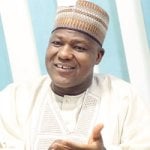Nigeria is not optimally harnessing her human resources for development by the discrimination against women in politics and government.
This statement was made by Professor Adeolu Akande, while speaking, as the guest lecturer on the topic, ‘Women, politics and inclusive governance for development in Nigeria’, at the 2016 edition of the press week and award ceremony of the Nigeria Association of Women Journalists (NAWOJ), Oyo State chapter, at the Dapo Aderogba Hall, NUJ Press Centre, Iyaganku, on Thursday.
Akande stated, “The argument is that if, by national statistics, the female gender constitutes 51 per cent of the Nigerian population, involvement of between seven and 13 per cent of women in elective and appointive offices is evidence that Nigeria is short-changing herself by not harnessing the full potentials of her human resources in governance.”
Akande noted that there is clear evidence of the challenges that women face in the quest to participate in politics and government as well as contribute their quota to national development, not only in Nigeria but across the world.
He added that “the participation of women in politics and government is a subject of concern in the literature because it is assumed that the surest way to protect the interest of women and the issues that are important to them, notably, the welfare of children and the family, is their involvement in the decision-making process.”
According to him, in spite of various arguments to support more involvement of women in government, Nigerian women remain discriminated against in terms of involvement in politics and government.
“The involvement of Nigerian women in politics has been more as cheer leaders and entertainers in campaign contingents and as voters in elections than as candidates or party officials,” Akande added.
He said an historical review of women engagement in politics and government bears this out, adding that, “the history of women participation in the politics and government of Nigeria has been one of rising expectation and rising frustration. As the advocacy for more women participation reaches its crescendo, so is the increasing frustration of such aspirants in the domain of Nigerian politics and government.”
The event honoured women that have distinguished themselves in human development. Awardees included the Co-Chairman of the African Newspapers of Nigeria Plc and Executive Director of Obafemi Awolowo Foundation, Dr Tokunbo Awolowo Dosumu; the Managing Director of Bovas and Company Limited, Mrs Victoria Samson and Mrs Olufunso Adegbola, the proprietor of Vale College.
In her acceptance speech, Dr Awolowo Dosumu, who dedicated her award to her parents and the Obafemi Awolowo Foundation, gave the definition of human development as stated by the UNDP, stating that “human development or the human development approach is about expanding the richness of human life, rather than simply the richness of the economy in which human beings live. It is an approach that is focused on people and their opportunities and choices.”
She added that human development is fundamentally about choice. “It is about providing people with opportunities. The process should at least create an environment for people, individually and collectively, to develop their full potential and to have a reasonable chance of productive and creative lives that they value,” she said.
Dr Awolowo Dosumu ended her speech by offering words of inspiration to the members of NAWOJ, describing them as brave women in a male dominated profession. She took her advice from a paper she wrote in June 1999.
“Make learning a continuous, lifetime pursuit. Above all, believe in yourself. You are made in the image of God, with your own unique potential and abilities. So, never allow anyone to convince you that you are inferior to any other human being. Refuse to be intimidated by competition. A woman who strives for success in our male dominated world is often misunderstood, cruelly maligned and deliberately obstructed.
“The stresses on the path to success are many and formidable. Nevertheless, always strive to maintain your femininity, but beware of timidity – it is a false definition of femininity. Learn to make a clear distinction between the two. Always remember that in this world, in spite of everything, women still have to do twice as well as men to be thought half as good,” she advised.
The Commissioner for Information, Culture and Tourism, Toye Arulogun, who represented Oyo State governor, Senator Abiola Ajimobi, in his speech, pledged the state government’s support for women journalists in the state while the chairman of the occasion, the Otun Olubadan of Ibadanland, Senator Lekan Balogun, congratulated all the awardees, stating that “they are all worthy of the awards” and urged everyone to continue seeking means of making life better for others.
The outgoing chairman of the Nigerian Union of Journalists, Oyo State, Mr Gbenga Opadotun, also got an award for his continuous support for the cause of women journalists in the state.
In her welcome speech, the NAWOJ chairperson, Funke Foluso Lala, stated that the association stands for creation of a better life for women and children.
Other dignitaries present, who were also presented with garlands, included the Chairman of ANN Plc, Reverend Omotola Oyediran; the Alakenne of Ikenne, Oba Adeyinka Onatade; and Senator Lekan Balogun.
Other dignitaries are the Managing Director/Editor- in- Chief of ANN Plc, Mr Edward Dickson, editors and management staff of the Nigerian Tribune.
WATCH TOP VIDEOS FROM NIGERIAN TRIBUNE TV
- Let’s Talk About SELF-AWARENESS
- Is Your Confidence Mistaken for Pride? Let’s talk about it
- Is Etiquette About Perfection…Or Just Not Being Rude?
- Top Psychologist Reveal 3 Signs You’re Struggling With Imposter Syndrome
- Do You Pick Up Work-Related Calls at Midnight or Never? Let’s Talk About Boundaries







